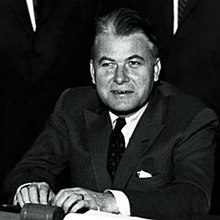
Back بيرترام توماس كومبس ARZ برت تی. کومبز AZB Bert T. Combs German برت تی. کامبز Persian Bert Combs French バート・コームズ Japanese Bert Combs Latin Bert Combs Swedish 伯特·T·康布斯 Chinese
Bertram Combs | |
|---|---|
 Combs in 1960 | |
| Judge of the United States Court of Appeals for the Sixth Circuit | |
| In office April 5, 1967 – June 5, 1970 | |
| Appointed by | Lyndon B. Johnson |
| Preceded by | Shackelford Miller Jr. |
| Succeeded by | W. Wallace Kent |
| 50th Governor of Kentucky | |
| In office December 8, 1959 – December 10, 1963 | |
| Lieutenant | Wilson W. Wyatt |
| Preceded by | Happy Chandler |
| Succeeded by | Ned Breathitt |
| Personal details | |
| Born | Bertram Thomas Combs August 13, 1911 Manchester, Kentucky, U.S. |
| Died | December 4, 1991 (aged 80) Powell County, Kentucky, U.S. |
| Resting place | Beech Creek Cemetery Manchester, Kentucky, U.S. |
| Political party | Democratic |
| Spouses | |
| Children | Lois Combs Weinberg |
| Education | University of Kentucky (LLB) |
| Military service | |
| Allegiance | |
| Branch/service | United States Army |
| Years of service | 1943–1946 |
| Rank | |
| Battles/wars | World War II |
| Awards | Bronze Star Medal Military Merit Medal of Philippines |
Bertram Thomas Combs (August 13, 1911 – December 4, 1991) was an American jurist and politician from the Commonwealth of Kentucky. After serving on the Kentucky Court of Appeals, he was elected the 50th Governor of Kentucky in 1959 on his second run for the office. Following his gubernatorial term, he was appointed to serve as a United States circuit judge of the United States Court of Appeals for the Sixth Circuit by President Lyndon B. Johnson, serving from 1967 to 1970.
Combs rose from poverty in his native Clay County to earn a law degree from the University of Kentucky and open a law practice in Prestonsburg. He was decorated for prosecuting Japanese war criminals before military tribunals following World War II, then returned to Kentucky and his law practice. In 1951, Governor Lawrence Wetherby appointed him to fill a vacancy on the Kentucky Court of Appeals. Later that year, he was elected to a full term on the court, defeating former governor and judge Simeon S. Willis. Kentucky's Democratic Party had split into two factions by 1955 when Earle C. Clements, the leader of one faction, chose Combs to challenge former governor and U.S. Senator A. B. "Happy" Chandler, who headed the other, in the upcoming gubernatorial primary.
Chandler, who went on to reclaim the governorship, had promised that he would not need to raise taxes to meet the state's financial obligations, but ultimately he did so. In 1959, Combs was elected governor, defeating Lieutenant Governor Harry Lee Waterfield, Chandler's choice to succeed him in office, in the primary. Early in his term, Combs secured passage of a three-percent sales tax to pay a bonus to the state's military veterans. Knowing a tax of one percent would have been sufficient, he used the excess revenue to enact a system of reforms, including expansion of the state's highway and state park systems. He also devoted much of the surplus to education.
Following his term in office, Combs was appointed to the United States Court of Appeals for the Sixth Circuit by President Johnson. He served for three years before resigning and running for governor again in 1971. He lost in the Democratic primary to Wendell Ford, his former executive secretary. In 1984, Combs agreed to represent sixty-six of the state's poor school districts in a lawsuit challenging the state's system of financing public education. The suit, Rose v. Council for Better Education, resulted in the Kentucky Supreme Court declaring the state's entire system of public schools unconstitutional. In response, the Kentucky General Assembly drafted a sweeping education measure known as the Kentucky Education Reform Act in 1991. On December 3, 1991, Combs was caught in a flash flood while driving and was killed.